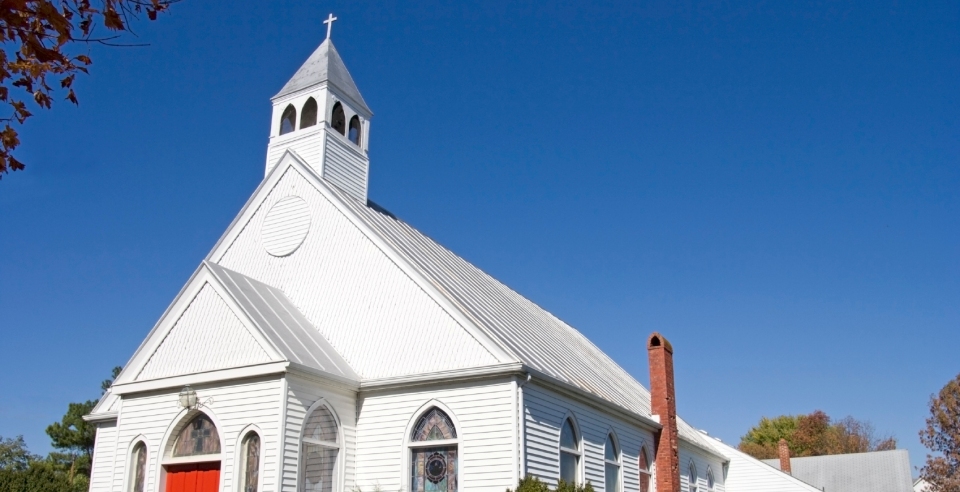
Summer has arrived and it's an ideal time to focus on endowment and financial management tasks. With fewer activities and events at church, summer provides an opportunity to review policies, educate committee members, and plan for the fall. To help you make the most of the summer, we’ve created a Summer Checklist for Your Church’s Endowment Management. This checklist will help your endowment, investment committee, and vestry make the most of the summer months.

Introduction
For decades, The Episcopal Diocese of Maryland has examined our history and wrestled with how we are called to repair the breach caused by slavery and racism. This post shares some insights into how our Diocese moved from research and learning to funding and action guided by our Baptismal Covenant, which calls us into becoming a beloved community of love.

This is the second installment in our two-part series on church branding. In the first post, "How Effective Branding Can Transform Your Church," we explored the importance of building a strong brand and how it plays a crucial role in fostering growth, enhancing community engagement, and inspiring gifts to your church's endowment. You can find that post here. Now that we've established the "why" of branding, let's delve into the "how." This post provides seven practical strategies for building your church's brand, helping you create a cohesive, welcoming, and memorable experience for both current and prospective members.

When you think of Coca-Cola, McDonald’s, or Nike, what images, emotions, and even tastes come to mind? Perhaps it's the unmistakable shape of a Coke bottle, the silhouette of the golden arches, or the iconic "Just Do It" slogan from Nike. These companies have mastered the art of branding, transforming their logos and names into memorable symbols of their products and values. But branding isn't just for corporations. It's equally important for institutions with deeper, more personal missions—like churches. Faith communities are vying for attention and relevance in the lives of their congregants and their broader communities, and understanding and honing your church's brand is key. Just as a strong brand can evoke trust and loyalty among consumers, a well-defined and communicated church brand can foster a deeper connection with current members, attract new ones, and extend your reach and impact within your community.

Endowment fund oversight is a significant undertaking. If you are a vestry, board, or committee member with this responsibility, you likely oversee investments and monitor spending. Increasingly, you also have a pivotal role in aligning the endowment with the future of your organization.
Strong endowment policies are anchored in an organization’s vision and goals. With a regular policy review, you can ensure that your endowment policies reflect any changing circumstances and continue to match your long-term objectives. These reviews can also help to re-engage committee members and encourage them to reflect on their roles and evaluate their stewardship of the endowment. In these meetings, you may ask questions like: Are we fulfilling our fiduciary responsibilities? Do we have a solid framework to address unforeseen changes or needs? And, crucially, how do we ensure that our endowment not only thrives but also makes a lasting impact?
The infographic below will help facilitate a thoughtful endowment policy review at your church or organization.
ECF has sample endowment policies that include vestry/board resolutions, endowment committee guidelines, an investment and spending policy, and various gift acceptance policies. Please email [email protected] for a copy. We can help you consider how to adapt them for your church or organization.

The ability to recognize assets beyond the church balance sheet – which typically looks only at financial assets and liabilities – has become an essential skill. Faith communities that can shine a light on their overlooked riches – well beyond their plate-and-pledge and endowments – can bring new life and new income to their ministries. And perhaps more importantly, congregations who can explore a new vision for “big picture” assessment and stewardship of their assets – with transparency, careful conversation, candor, and deep discernment – can find new life in a deeper relationship with both their assets and their community.

What is our true purpose?
Reflecting on that 2019 “Vestry Papers” article, Nathan LeRud, dean of Trinity Cathedral, Portland, OR, reckoned, “We are not where we were four years ago.”

In this new blog series on “Reframing Assets”, we hear how four churches adjusted their thinking about their finances after Covid – reimagining assets, uncovering riches beyond the balance sheet, and charting a new course for ministry. In 2019 these churches shared plans to repurpose assets for ministry. Now, they update us on the critical four years since then, sharing lessons learned, insightful examples, and practical strategies for financial adaptation, asset realignment, and visionary stewardship. Learn how they seek to breathe new life into their community and thrive amidst change.

In September 2019, churches were just beginning to recognize the shifts in demographics and culture that became indelibly apparent to, literally, the entire world once the Covid pandemic struck. Nearly four years ago, in a “Vestry Papers” article, ECF featured the innovative strategies some church leaders were discovering to assist in funding ministry and their endowments.

What are active and passive investing?
The question of active or passive investing – which to use, which is better? – may have begun decades ago but remains a hotly debated topic today. What is active investing? It is an investment method that relies on skilled managers to research and select investments that are expected to generate higher returns than the broader market. By contrast, passive investing seeks simply to replicate a market index, often at low cost, gaining returns comparable to that of the broader market.

Unlocking the potential of young donors in your faith community demands a multifaceted approach. In this insightful infographic, we explore five powerful strategies proven to engage and inspire the next generation of philanthropists.

A sustainable endowment depends on wise spending. Do you need to take a fresh look at how you make spending decisions at your church? In the following infographic, we clarify five common misconceptions that may affect your endowment spending decisions.

Endowment funds are long-term funds, and they are appropriately invested in diversified portfolios of varying asset classes based on expectations about how each asset class will perform over the long term – typically, 10 years or more. Asset classes in an endowment portfolio will likely include equities and fixed income, US and international, large caps and small caps, and so on.

A healthy diet is a balanced diet that includes a wide variety of foods in appropriate proportions. Each food group serves a different purpose – dairy products provide calcium for strong bones, carbohydrates provide energy, and fruits and vegetables provide vitamins and minerals. A body’s immediate needs may fluctuate, but over time all food groups work together to provide the nutrients that a body needs to function properly.

An endowment is a powerful tool for churches to use to achieve long-term financial stability. An endowment is money designated for the long term to serve both current and future needs. A portion of the endowment can be used each year to support the church’s mission while the remaining amount helps ensure its long-term sustainability. In this post, we will discuss three critical aspects of structuring an effective endowment fund: organizing, investing, and growing.

More than 15 years ago when my mom passed away, I started a small endowment to fund the upkeep of her plot. This endowment is invested for the long-term to preserve its purchasing power and provide a stable income stream that will ensure my mom’s grave is well taken care of in my lifetime, in her grandchildren’s lifetime, and even beyond. Knowing this brings me great comfort each and every night before I go to sleep.

A new energy is springing up in churches looking to inspire new gifts to endowment. We’ve recently talked to several churches who are making plans for an endowment campaign, whether to grow an existing endowment or start a new one. While there are several steps to success, in this blog post we’ll focus on one: engaging parishioners by telling the impact story of your church so far and linking that to a future vision.

In Investing in the Future, Josh Anderson, Associate Program Director, ECF Endowment Management, outlines five things prospective donors want to know about your endowment.

